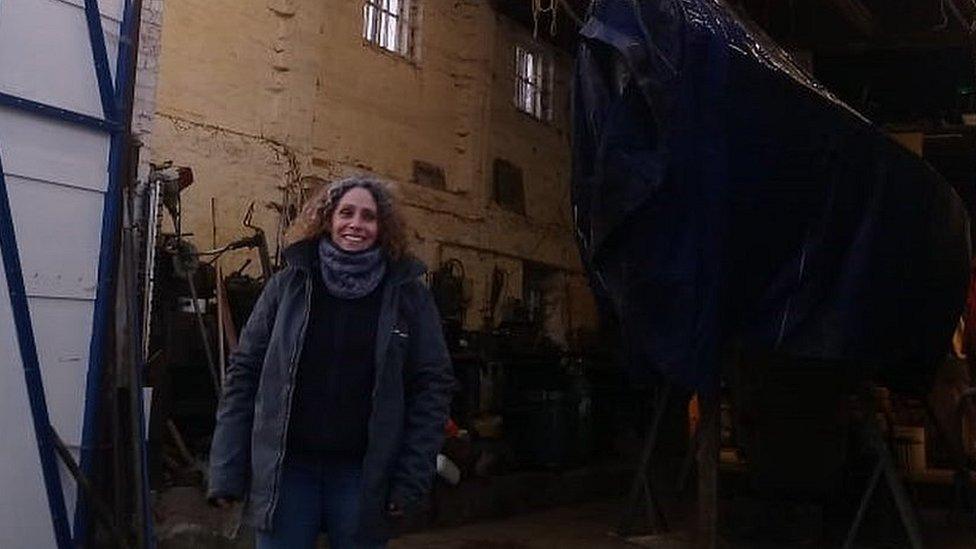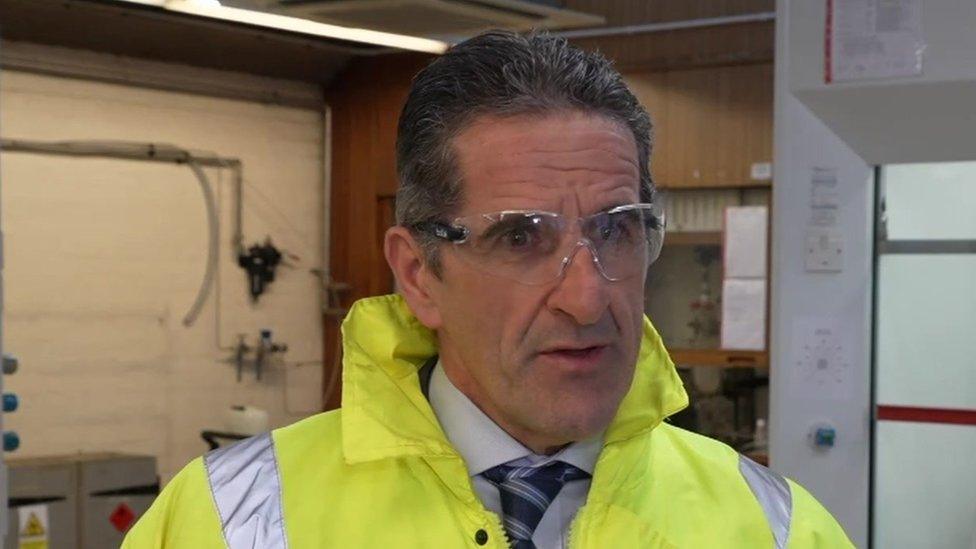'Energy prices will still absolutely soar for us'
- Published

Charlene Lyons says if she passed all costs on she would have to charge £10 a pint
Businesses are still digesting a government announcement detailing how support for energy bills will change once the current scheme runs out in March.
But the initial reaction so far seems to be one of disappointment - and fear.
"Energy prices will still absolutely soar for us and for everybody else as well," said Charlene Lyons, chief executive at Black Sheep Brewery in Yorkshire.
The new "energy bills discount scheme" for business, external will differ substantially from the current arrangement in terms of how taxpayer-funded help is applied.
Under existing support, the government has capped gas and electricity bills for companies meaning that if prices rise above a ceiling, it is the state that bears the cost.
The new scheme, set to launch in April, will apply a discount to wholesale energy prices. If wholesale prices rise, it will be the business that takes the pain.
Before unveiling the new energy scheme, Chancellor Jeremy Hunt called the current support "unsustainably expensive". It will cost £18bn over six months. In contrast, the new package will run for a year at £5.5bn.
As an energy-intensive business, Black Sheep Brewery will get a steeper discount under the new scheme.
But the company also owns five pubs which will not benefit from the bigger discount and neither will the many pubs that Black Sheep Brewery supplies.
Ms Lyons said: "We know that if pubs don't get the same level of support they are going to be impacted in the same ways they have been impacted recently which is shorter opening times."
In its announcement, the government said that energy-intensive businesses, such as manufacturers, will get more support because they "are often less able to pass through cost to their customers due to international competition".
But it is not exactly easy for other businesses either.
"If we were to push all of the price increases over to the consumer across the board, whether it be energy, input costs of raw materials and everything you'd be talking about over £10 a pint, which is clearly not sustainable," said Ms Lyons.

Boat yard owner Sarah Curtis says she is relatively lucky "for now" because she was able to lock-in energy prices until 2026
Raoul Perfitt, who runs Herb UK, a haircare production firm in Lymington, said he has already seen huge resistance from retailers when he suggests he might need to pass on higher costs.
Herb UK has seen increases across wage bills, manufacturing, raw materials and warehouse rental costs over the past year.
But Mr Perfitt is at least happy that the new energy scheme gives the company some certainty to plan beyond March when the existing arrangement ends.
"Obviously we need time to assess exactly how much this will reduce our bills by. But in the current extremely challenging economic conditions any assistance is very welcome." he said.
Some businesses, however, might not make it at all according to Martin McTague, chair of small firm lobby group Federation of Small Businesses.
"We know there are roughly one in four businesses that are seriously considering their future," he said. "I know a lot of small business owners are saying to themselves 'do I wait and see what happens in March or do I decide to cash my chips in now?'."
Those that can stick it out find themselves facing tough choices.
Adrian Hanrahan, managing director of Robinson Brothers, a chemicals producer in West Bromwich, welcomed the government's new energy support scheme: "All help is very, very welcome."

Robinson Brothers' managing director Adrian Hanrahan expects his energy bill to triple this year
But he said: "We're a small company, our energy is tripling this year which means that being a small company we have one pot of money.
"I fear that redirecting our money away from innovation into basically survival is not a good thing for the business and it's not a good thing for UK plc either."
Companies have received billions of pounds worth of government support since Covid emerged in early 2020, including the furlough scheme.
Sarah Curtis, who runs a boat yard in Ipswich, concedes that state support "has to be paid back".
"At some point the government has to get realistic and no doubt business will share the brunt of that," she said.
Ms Curtis, who has run the business for 17 years and employs four people, said that she is relatively lucky "for now" because she was able to lock-in energy prices until 2026.
But that doesn't mean it's smooth sailing ahead. "It's going to get worse for all of us before it gets better," said Ms Curtis.

How is your business being affected by the rising cost of energy? Share your experiences by emailing haveyoursay@bbc.co.uk, external.
Please include a contact number if you are willing to speak to a BBC journalist. You can also get in touch in the following ways:
WhatsApp: +44 7756 165803
Tweet: @BBC_HaveYourSay, external
Please read our terms & conditions and privacy policy
If you are reading this page and can't see the form you will need to visit the mobile version of the BBC website to submit your question or comment or you can email us at HaveYourSay@bbc.co.uk, external. Please include your name, age and location with any submission.
Related topics
- Published10 January 2023

